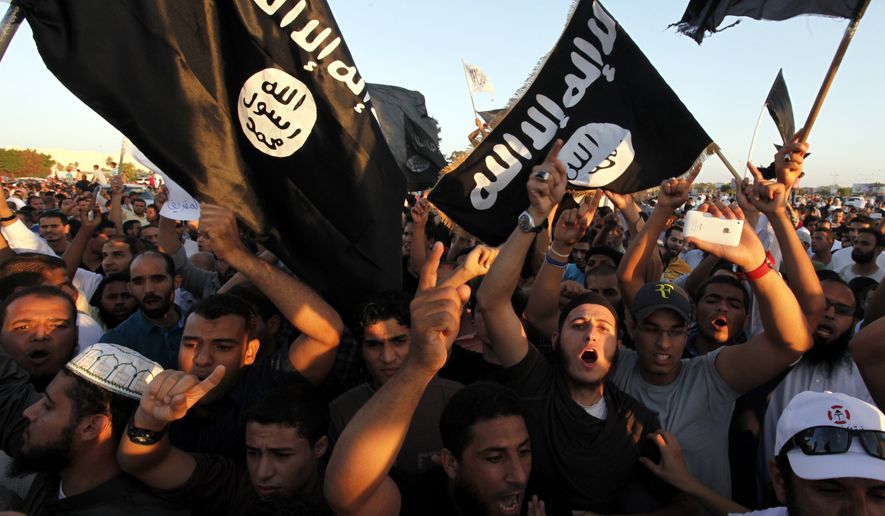Libya’s top diplomat in Washington wants aggressive U.S. support in containing the Islamic State’s rise in her nation but strongly rejects the idea of an American-led bombing or ground offensive, saying it would just make things worse.
In an acknowledgment of how poorly some in the region see the U.S.-led campaign against the Islamic State in Syria and Iraq, the charge d’affairs of the Libyan Embassy in Washington said replicating that strategy in Libya would likely draw more foreign fighters into the nation.
“We don’t want Libya to become a land for the jihadists from all over,” said Wafa Bugaighis, who told reporters during a roundtable discussion that there are already more than 5,000 fighters on Libyan soil aligned with the Islamic State, also known as ISIS and ISIL.
At the same time, Mrs. Bugaighis lamented Washington’s ambivalence toward backing what she described as the only “legitimate and democratically elected” government in Libya as it attempts to contain the Islamic State.
The government, which has operated out of the northeastern Libyan city of Tobruk since an Islamist parliament took over Tripoli last year, is in dire need of military training and hardware, as well as counterterrorism intelligence sharing from the West, she said.
“This is the support we really want,” she said. “If you dry up the resources of funds and arms to [the extremists], then I think our institutions, our national institutions — if they are supported by equipping and training and arms — they can take care of it.”
PHOTOS: Top 10 U.S. fighter jets
There is, however, a catch.
The Obama administration has shown little willingness to engage deeply in Libya since the 2012 terrorist attack there that killed Ambassador J. Christopher Stevens and three other Americans. The overall posture of withdrawal has seemed only to accelerate since last year, when Libya’s chaotic election gave rise to two separate governments now vying for control of the nation.
Washington and its European allies have offered rhetorical support for Mrs. Bugaighis’ government, which is pushing a secular message from Tobruk.
But the West also has granted a kind of unofficial legitimacy to the other government, in Tripoli, since the United Nations began engaging it recently in a peace process that aims for new elections to be held and a unity government to be formed at some point.
The process has yielded little progress. Militias loyal to the Tobruk and the Tripoli governments continued carrying out attacks against each other last week as the latest round of talks came to a close in Morocco.
Then there is the Islamic State, which is keen to exploit the situation.
U.S. officials say Islamic State-aligned groups now control the key oil port town of Derna. Officials in Mrs. Bugaighis’ Tobruk government say the foothold is actually much wider, with ISIS fighters occupying territory in as many as six cities and towns, including parts of Tripoli, despite the capital being under the nominal control of a different Islamist group.
The Islamist-leaning parliament in Tripoli is led by a group calling itself the Libya Dawn movement. Although the movement is said to control vast territory through a network of loyal militias, debate is heated over the extent to which it has facilitated, or at least turned a blind eye to, the Islamic State’s rise in Libya.
In a February interview with The Washington Times, Aref Ali Nayed, a top adviser on security policy to the secular government in Tobruk, suggested that the two are working hand in hand.
U.S. intelligence officials say the relationship is complex and warn that members of the Tobruk government may be overstating it in the interest of drawing Washington toward its side of the conflict.
Although some analysts have said Tripoli’s Islamists and the Islamic State would seem a natural fit for an alliance, there have been reports of fighting between militias loyal to Abu Bakr al-Baghdadi and those beholden to Libya Dawn.
In mid-March, clashes broke out between the Islamist groups in the Libyan city of Sirte, roughly 300 miles from Tripoli. The city is the hometown of the late Libyan dictator Moammar Gadhafi, and analysts say it has been a fount of extremist activity since the U.S.-backed ouster of Gadhafi in 2011.
On a separate front, the Libyan “branch” of the Islamic State made international headlines in February when it circulated a video showing the beheadings of 21 Egyptian Coptic Christians. With Washington disengaged, Egypt responded with a double wave of retaliatory airstrikes against Islamic State targets in Libya.
Mrs. Bugaighis said Cairo coordinated with the Tobruk government on those strikes, but she described them as a “one-time” event and stressed that the Tobruk government would support neither a wider Egyptian nor an American-led campaign against the group inside Libya.
“We don’t want any foreign troops on the ground,” she said. “We want support to our own institution, by equipping it, by training it, by enabling it — it will carry on the battle on its own with international support, but no boots on the ground.”
The bottom line, Mrs. Bugaighis said: Washington and its allies are playing a dangerous game by waiting on the sidelines while the United Nations attempts to broker peace in the nation.
“[People] say there are two governments, two parliaments,” she said. “The fact is one is legitimate and democratically elected, [and] one is self-proclaimed and completely illegitimate.
“Time is of essence,” she said. “Can we afford waiting and having the terrorists thrive in the meantime?”
• Guy Taylor can be reached at gtaylor@washingtontimes.com.




Please read our comment policy before commenting.